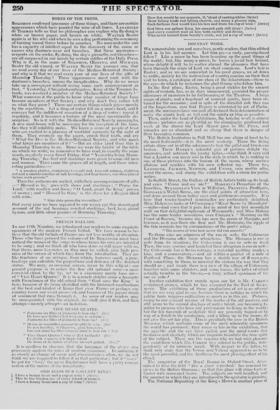FRENCH BALLADS.
IN our 17th Number, we introduced our readers to some exquisite specimens of the modern French ballad. We have reason to be- lieve that the old ballads of France are not less worthy of attention. Those who have perused the volumes of De BERANGRR DMA have noticed the names of the songs to whose tunes his own arc intended to be sung ; and we think all who have clone so will agree with us, that these, mere key-notes as they may be called, give high pro- mise of the verses of which they form the introduction. They arc like fractures of an antique, from which, however small, a prac- tised eye can calculate the 'import ions and delicacy of the finished statue. We may, its occasion serves, recur to this subject: our present purpose is to notice the fine old national song—a mere convivial chant by the by, set to a charming manly bass air— of "Vivo Henri Quatre." It is in a much stricter sense a favourite with Frenchmen of the old school than " God save the King" is here, because of its Icing identified with the historical recollections of lire best and kindest of Kings that ever France or perhaps any country (save out' own) possessed, and because of the joyous strain of sentiment that runs through it. As some of our readers may be unacquainted with the original, we shall give it first, and then attempt—merely (-Would—an imitation.
VICE HENRI QUATRE.
" .Daimons les fines et j'aimons le bon yin ! (Lis)
Dc tous nos drilles c'cst toujours le refrain- J'aimons les filles et j'aimons he bon yin !
" Moins do somIrilles eussent troubki le sein (Ns)
De nos fainiiics, si I'liguenx, plus humains, Eusscnt Mini; les fines cussent aims le bon yin ! (his)
" Vive Henri Qitatre ! wire co Roi vaillant ! (bis) Cc (liable n quilt ro a lc triple talent
Dc boire et de battre et d'etre un vcrt galant. (Lis.)"
It is needless to observe, that the language of the above sins grievously against the rules of modern grammar. In imitating- it as closely as change of scene and circumshinces allow, we do not think we ate required to follow it in that. particular ; but if " loves" be put. for " love," the mere Englishman will have a pretty correct notion of the nature of the incest HOD BLESS Ol'R GALLANT KING ! I love a bonny lassie and a cup of wine ! (twice) This be the burden aye of every friend of mine— I love a bunny lassie and a cup of wine ! (twice) How few would be our quarrels, if, 'stead of canting whine (twice) 'Bout failing trade and falling church, and many a gloomy sign, Each factious fool would kiss his lass and drain his cup of wine! (twice) God bless our gallant King, his onward path still shine (twice) And every comfort wait on him both earthly and divine, Who never turned from beauty's smile, nor yet a cup of wine ! (twice)


















 Previous page
Previous page